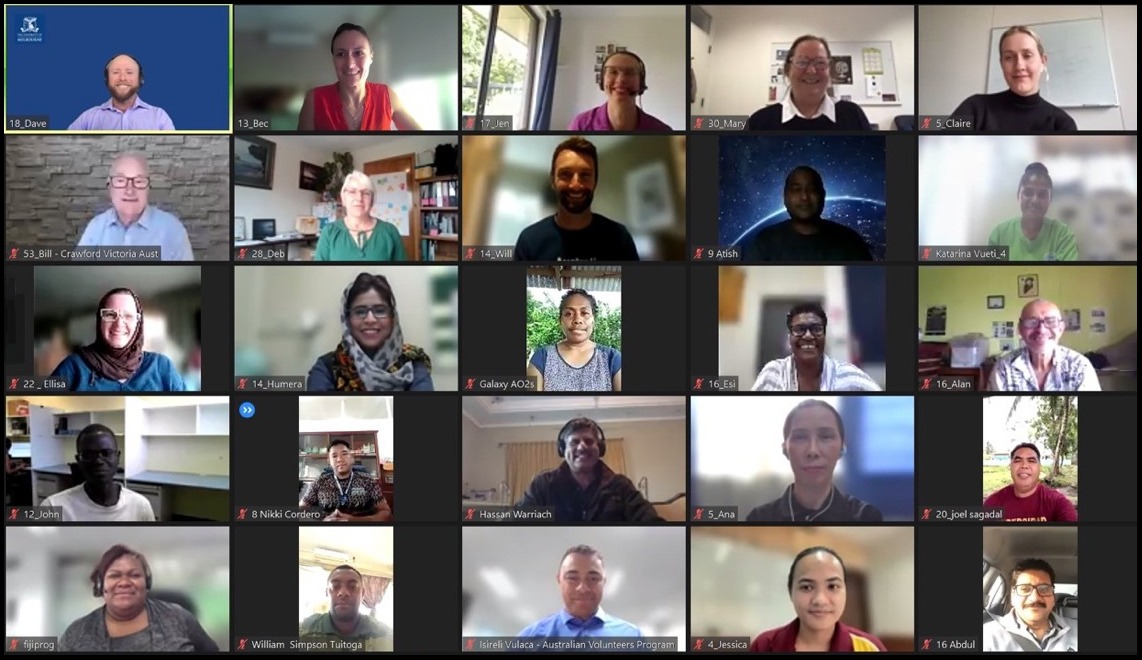

Bringing LIFE to extension and research, online
November 9, 2023

The Crawford Fund Victoria Committee supported online training for extension research in development and farmer engagement projects to support early and mid-career researchers (EMCRs). The training was delivered by a team from the University of Melbourne (UoM) over a five-week period, with online workshops twice a week, and outside of these times, participants had time to connect with their group to discuss different activities and scenarios to support the learning process.
“This project tied together the research teams and lessons from three ACIAR projects, run in the Philippines and Fiji by RMIT and in Pakistan by the University of Melbourne, which focused on different aspects of extension research,” said Dr David McGill, Senior Research Fellow at the University of Melbourne. David has been involved in managing Crawford Fund and RAID Network training, is a founding member of the RAID network and spoke on “Innovations for Extension” at our 2022 Conference.
“The preface was to link these projects, all at different project-cycle stages together to exchange lessons and it was timed to help inform a new ACIAR project in Fiji,” he said.
The training took on the challenge of building on a previous online workshop experience which became the norm during the COVID pandemic. It had two primary objectives:
- To provide a platform for sharing experiences across extension projects in the R4D space
- To capture extension lessons across different contexts to provide a useful toolkit for EMCRs working in R4D projects.
“The aim of the new ACIAR project in Fiji is to test whether a Landcare approach, using the Livelihood Improvement through Facilitated Extension (LIFE) model, can be adapted from one country context to another and applied to the Fiji extension context. Hence, lessons from previous ACIAR projects (in the Philippines and Pakistan) with long term investments, partnerships and engagements from Victorian universities and researchers can provide valuable insights in terms of systems thinking as well as the interplay between crops and livestock,” said David.
In carrying out this online workshop, we strengthened institutional, national and personal networks at a critical time for the new Fiji based project and were able to provide a virtual link to an amazing network of extension experts across the Philippines, Pakistan and Australia, when travel funding for in-country training was not available explained David.
A key component of the workshop involved working through a scenario which aims to replicate the activities and challenges faced by EMCRs when working on extension in research for development projects. There were four parts of the scenario which participants were given each week to discuss within their group during the Zoom sessions and in their own time. The scenarios were developed in a way to take participants through the steps in starting a new project and supported and enabled discussions between ad within groups about key skills and lessons that you can be applied to their own work.
“This workshop provides a great example of how ‘good quality’ and engaging online workshops can be run, which are now critical to the ‘new normal’ of managing our projects overseas,” said David.
According to David, the workshop also achieved the following outcomes:
- Provided volunteer positions (four with the Australian Volunteers Program), which helps support careers as they develop. Their role was to help facilitate and engage with the participants from the different partner countries and organisations throughout the program.
- Built capacity of facilitators, now with experiences, resources and tools ready for the next opportunity.
- Established and strengthened relationships between the UoM team, RMIT, partner institutions in Fiji/Pakistan/Philippines, AVP and the Crawford Fund.
In delivering this online model, the convenors asked the question: “Does the virtual environment provide a social platform for effective participatory learning when used in a developing country context?”
“The qualitative data from our research component shows that a virtual environment does provide an effective platform for participatory learning. This style of engagement does facilitate the exchange of target knowledge, but more importantly allows for in-depth exchange of ideas and discussions as well as the fostering of new relationships cross-culturally. Although this was seen as a valuable and successful workshop by participants, there was an over-all preference for face-to-face engagements in future,” concluded David.




